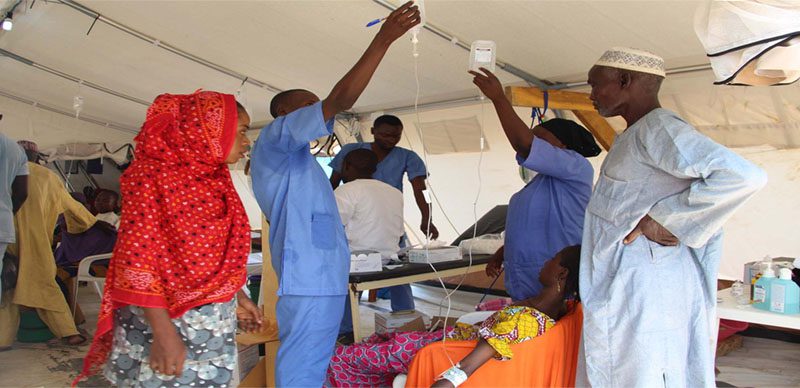 The cholera outbreak in Nigeria has claimed 63 lives from 2,102 suspected cases in 122 local government areas across 33 states as of June 30, 2024, it emerged on Tuesday.
The cholera outbreak in Nigeria has claimed 63 lives from 2,102 suspected cases in 122 local government areas across 33 states as of June 30, 2024, it emerged on Tuesday.
The previous figures from June 26 reported 54 deaths from 1,579 cases in 115 LGAs across 32 states, indicating that the outbreak has spread to more areas, resulting in nine additional deaths from 523 new cases in seven LGAs and one additional state.
According to a press release on Tuesday, July 2, by Jide Idris, Director General (DG) of the Nigeria Centre for Disease Control and Prevention (NCDC), the country’s case fatality rate since the beginning of the year stands at 3.0%.
He said 10 States of Lagos, Bayelsa, Abia, Zamfara, Bauchi, Katsina, Cross River, Ebonyi, Rivers, and Delta contribute about 90% of the cases, with 7 of them from the Southern States.
According to him, the agency is monitoring the situation nationwide with the activation of the National Cholera Multisectoral Emergency Operation Centre (EOC) that parades an array of subject matter experts and provides strategic coordination, meets daily, and provides periodic situation reports for stakeholders.
“This also ensures effective mobilization, harmonization, and distribution of resources to support the affected states.
“This is done through the relevant thematic areas of response that cover coordination, surveillance, case management, infection prevention and control, risk communication and community engagement, Water Sanitation and Hygiene, Vaccination, Logistics, Research with a costed Incidence Action Plan for the response developed and being implemented.
“These will help facilitate rapid communication, data analysis, and decision-making.
“It will also ensure that we deploy resources efficiently, strengthen surveillance and diagnostic capacity, enhance treatment of affected persons, and intensify public awareness and community engagement activities.
“Prior to the activation of EOC, the NCDC, through the National Cholera Technical Working Group had carried out the following prevention and response activities.
“It is pertinent to acknowledge and highlight the strong political will to control the outbreak as demonstrated by Mr President’s constitution of interministerial cabinet committee (including ministers of health, environment, water resources and sanitation, education, information and national orientation youth, aviation, women affairs, budget & planning, special duties and intergovernmental affairs, finance), to support the ongoing control effort, especially through specific relevant interventions relating to their ministries and agencies.”
He also highlighted the challenges that contributed to the outbreak of the disease, listing open defecation among other challenges, “Only 123 (16%) of 774 LGAs in Nigeria are open defecation free.
“With Jigawa as the only open defecation-free state in Nigeria. More than 48 million Nigerians practice open defecation
“Inadequate toilet facilities and existing ones even in many government facilities not well maintained; inadequate Safe water and poor sanitation: 11% of schools, 6 % of health facilities, 4% of motor parks and markets, have access to basic water, sanitation and hygiene services; poor waste management practices; poor Food, environmental and personal hygiene practices; and capacity gap among health care workers at the state and LGA levels
Other challenges include weak regulation on construction of soak away and bore holes (some sunk close to water source and bore holes sunk in wrong location); inadequate Implementation and enforcement of public nuisance law and other relevant public health laws; inadequate capacity at State level – delayed disease reporting and response action; poor regulation of food vendor and commercial water supply on hygiene; low knowledge and practice of basic hygiene such as hand washing; and effect of climate change and flood
While he advised the public to endeavor to reduce the risk of cholera by prioritizing personal hygiene, he urged caregivers to always practice standard safety precautions.
To the State governments, the DG said, “NCDC continues to advocate to State Governments on the need to prioritise action for solutions that ensure access to and use of safe water, basic sanitation, and proper hygiene practices in communities.
“Efforts need to be doubled to ensure more LGAs are open defecation free and see to provision of dedicated and equipped facilities for managing cholera cases with relevant treatment and infection prevention and control supplies in place.
“It is critical to also address the relevant capable workforce shortfall at state and LGA level to improve capacity to prevent, detect and respond to public health emergencies.
“The Ministries of Water Resources and Environment are urged to ensure adequate and functional Water, Environment, Sanitation and Hygiene (WESH) facilities in all LGAs and communities.
“As the NCDC continues to work with partners to lead the health-sector response to cholera outbreaks, we hereby call on all stakeholders—government agencies, sub-national level actors, partners, civil society organization, healthcare professionals, community leaders, and every citizen—to play our parts actively to stem the tide of this outbreak and redouble efforts to contain the spread and prevent further loss of lives”

